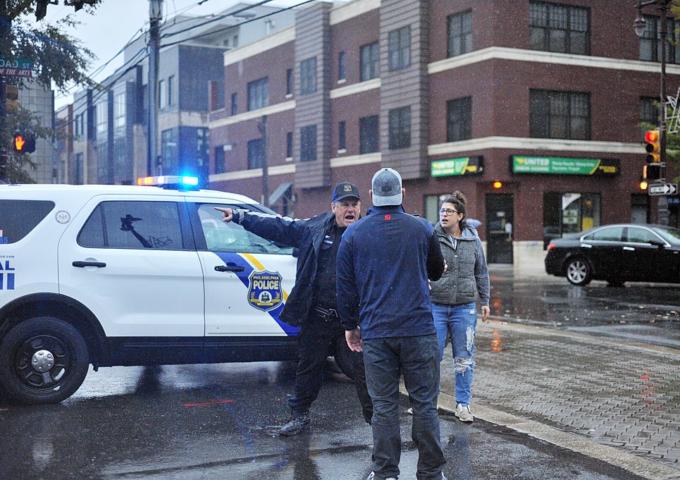By Michael P. Tremoglie
The urgency of solving the opioid crisis is apparent. Americans are wasting away because of this scourge. Funds to remediate this blight are available by a settlement between pharmaceutical companies and state, as well as, local governments. But some are delaying settlement.
The pharmaceutical companies that have profited from the use of opioids have agreed to make amends for their actions. Without acknowledging fault, the pharmaceutical companies have arranged for $26 billion to be made available to states and counties in order to reverse the problems caused by the drug. These funds will be used for treatment and interdiction.
It is vital to devote the resources for prevention and rehabilitation now. The idea that a municipality like Philadelphia does not want to settle because they are gambling on getting more money is unconscionable. Philadelphia’s District Attorney, Larry Krasner, whose lenient prosecutions of criminals have left the city in a virtual state of siege, refuses to enter into the proposed settlement. He seems to be more concerned about money than lives.
His actions are so egregious that even the Attorney General of Pennsylvania, Josh Shapiro, has criticized him. Pennsylvania stands to get $1 billion from the settlement. Krasner, who has been litigating the opioid companies since 2018, rejected it. He believes the amount of money the city will receive – projected to be $5 million to $8 million per year over 18 years according to Krasner – is not adequate. He also thinks that the city might not receive any money at all.

One day after Pennsylvania announced the settlement, Krasner sued Shapiro. His contention is that the state cannot take away Philadelphia’s “right” to sue pharmaceutical companies about opioids. He called the settlement a “sellout.”
Krasner’s use of the term “sellout” is rather remarkable. It indicates that money is the only issue involved. This is not so when one thinks of the help that can be provided by this settlement to those suffering from opioid addiction. Apparently helping those in need is a tertiary concern for the Philadelphia DA.
A spokesperson for the PA Attorney General’s office, Molly Stieber, said in a statement, “We’re puzzled that the Philadelphia District Attorney would take less than 24 hours to analyze a complex nationwide framework before suing our office and misrepresenting the facts to Pennsylvanians.” She mentioned that the settlement already provides local governments the ability to opt out.
But, Stieber noted that this settlement, “ is the only way to jumpstart a billion dollars’ worth of treatment for communities in need any time soon. The alternative is to make families wait years for an uncertain outcome that could leave them with nothing.”
She added, “These other lawsuits have no trial date nor a guarantee that any success in those cases would expand treatment – unlike this proposed settlement.”
This is the crux of the matter is it not? Does Krasner (and others like him) factor in the cost of waiting for a future settlement that might give them more money – or none at all? Money has a time value. In this case that time value is measured in the cost of lives.
Drug overdose casualties in the United States exceed those from combat – by a large factor. Last year, according to new data from the CDC, 93,331 died from overdoses. According to an analysis by age group of the CDC overdose data by the Kaiser Family Foundation, of the 49,860 opioid-related overdose deaths in the USA in 2019, 13,692 or 27 percent were in the age group 0 to 34 years of age. By contrast, there were 93 military deaths in Operation Freedom’s Sentinel – the official name for the war in Afghanistan – from January 2015 to August 2021.
While no overdose data was available for the specific group of ages 17 to 34 – which would be the ages for military service – a reasonable presumption can be made that a large percentage of the 2019 overdose age 0-34 cohort would have been military age personnel.
Each wasted life has a cost not only to the individual but to their families and to their communities. Why take such an enormous gamble with the lives and welfare of others? Is it for personal pecuniary gain? Is it for fame? Is it for ambition?
Need should take precedence over greed. All state and local governments should participate in this settlement and get down to the business of renewal.
______________________
Philadelphia, Vienna and Havana
As the number of U.S. personnel afflicted by the Havana Syndrome grows amid a dramatic uptick in the hotbed of diplomacy and espionage that is Vienna, Philadelphians might not realize their city’s prominent and years-long role in what sounds like something out of a spy novel. A cluster of neurological and sensory symptoms afflicting U.S. personnel in Cuba led to the 2017 selection of Penn’s Perelman School of Medicine’s Center for Brain Injury and Repair as coordinator of the interdisciplinary effort to address this emerging mystery.
Over the course of 2017 and 2018, the Center examined 44 patients, documenting their findings across two studies in the Journal of the American Medical Association. Patients complained of sudden nausea, hearing loss, ear pain, fatigue, and more. The Penn researchers identified the set of symptoms as a new syndrome, comparable to but distinct from other types of brain injuries. They suggested that the effects are consistent alteration of brain matter.
The research at Penn informs our debate on an emerging phenomenon that has afflicted U.S. personnel on six of seven continents, most recently in Berlin and possibly in Vietnam during Vice President Harris’ visit in late August. Washington is alarmed by the escalation of cases in Vienna – the setting of the P5+1 talks with Iran and home to many international agencies. The CIA is stepping up its defensive efforts with a new task force and a heavier emphasis on non-kinetic targeting, and Congress is guaranteeing financial aid to victims. But these steps, likely meant as early building blocks to further response, are insufficient even in that context.
When you’re taking American casualties – and that’s what these are – you don’t wait for perfect attribution to respond. The general, and very rough, consensus among investigators is that these are some form of directed radio-frequency energy attack. Based on the pattern of which officers and officials were targeted and where – is that Russia is to blame. Yet neither the absence of a smoking gun, nor even a strong consensus on the mechanism and culprit, should prevent the United States from immediate defensive and retaliatory actions.
We should take two steps. The first: assume Russia is behind these attacks and aggressively disrupt Russian intelligence activities across Vienna. Clandestinely sweep every nearby facility and every parked vehicle, examine every nearby lamppost and power line, and shadow every Russian officer, so that we are staring them down as they move about the city. If the new symptoms slow or move to another operating environment, that’s a reasonably good sign we are over the right target.
Secondly, we should serve notice to the international community that until we find the source and the culprit, the U.S. will not be operating in the old “business as usual” diplomatic mindset. The P5+1 talks with Iran are in Vienna – announce that we won’t return until the safety of our personnel can be guaranteed. Pull our representatives – if only for a week – from any scheduled events or meetings at the myriad international organizations doing business there. Ring the alarm bell now and make clear that the safety of U.S. personnel is an expected condition of our participation with partner nations.
This latter set of diplomatic actions has costs. It serves the goals of our adversaries in the short term by diminishing the U.S. diplomatic and intelligence presence and may put at risk other time sensitive international priorities and negotiations. Yet continuing to proceed as we are now – unwilling to seriously confront these provocations, nor the major acts of cyber-subversion against our country – guarantees more attacks. Diplomatic gains aside, that’s not a sustainable foundation upon which to shape our approach to the world.
It would be easy to dismiss this approach as a “Ready, Fire, Aim” approach. These steps are blunt and imperfect, with likely collateral damage. But for nearly six years we have ceded the initiative to others, and it is time for that era to end. Amid a dramatic escalation in Vienna by a foreign adversary, it’s time for us to interrupt the pattern of aggression by getting aggressive ourselves. The health and operational fitness of U.S. personnel around the world are on the line.
Jason Killmeyer is a counterterrorism and foreign policy analyst, with a background in emerging technologies.




